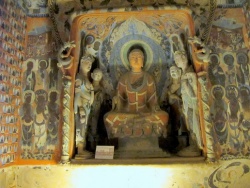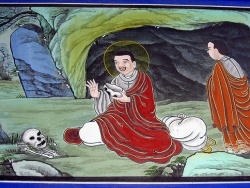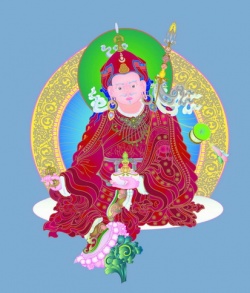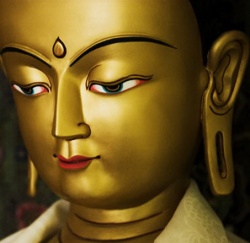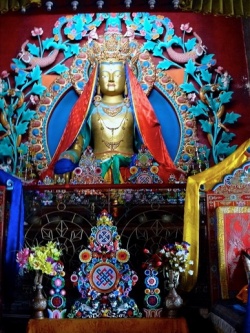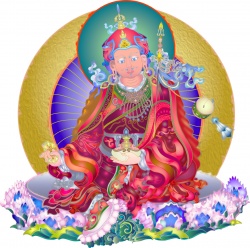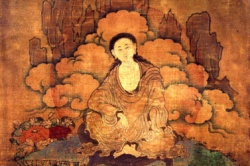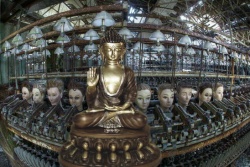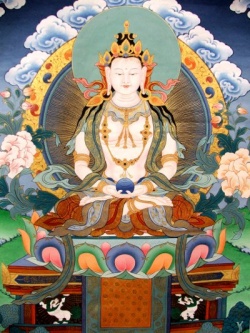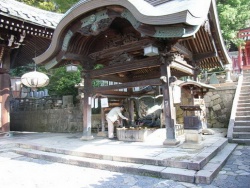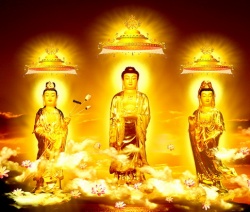Mangala Sutta Page
(Discourse on Blessings)
The word 'Mangala' means Blessings and Sutta is Discourse.
The Mangala Sutta was one of the many discourses preached by the Lord Buddha during His ministry of 45 years.
Origin
Superstitions, blind beliefs in omens and auspiciousness were a common affair in India during the times of Lord Buddha. People were very divided on their nature and implications and were very much addicted to such superstitions and about omens of good and bad luck. There was therefore arisen a need that someone should inquire the views of the Great Teacher, the Buddha on the subject. A special messenger (deity) was sent by King Sakkha to meet the Buddha while He was staying at the Jetavana Monastery in the garden of Anathapindika at Savatthi to inquire His views on omens.
Note: Anathapindika was a supporter of Lord Buddha and a millionaire. As a mark of gratitude to his great Teacher, he presented to Lord Buddha the entire grove belonging to Prince Jeta and built a monastery on it. The price of the grove was determined by the ¬number of gold coins which covered the whole grove. Many great Suttas were expounded at the Jetavana Monastery.
The entire Discourse outlines family responsibility, social obligations, moral purification and even spiritual cultivation. The Sutta. also stress on personal discipline, righteous conduct and adequate discharge of duties to one's near and dear ones.
The Sutta comprises of 38 Blessings incorporated in 11 stanzas with introductory paragraph which serves as the origin and the circumstance that led to the preaching of the Discourse.
Stanza 1
Bahu Deva manussa ca
Mangalani acintayum
Akankhamana sotthanam
Bruhi Mangala muttamam.
“Many deities and men,
Yearning after good,
Have pondered on Blessings,
Pray tell me the Highest Blessings”
Here a question is asked by a Deva to Lord Buddha to which the subsequent 11 stanzas provide the answer. The Deva informed the Lord that both the Devas in the Deva world and the human beings had been pondering for a long time as to what were real blessings, omens and auspices and inquired the views of the Great Teacher.
- 38 Blessings start from here:-
Stanza 2
(1) Asevana ca Balanam
“Not to associate with fools”
Asevana - Not to associate
Bala - Fools
Here fools are being interpreted as people with bad characteristics, unwholesome behaviour and evil conduct. They are people who dissuade you from doing good and persuade you to do evil. The underlying idea is that one must not follow them or take them as a standard for conduct or personal guidance. In this present society of ours, we are living in the midst of all kinds of people and this Sutta warns us against entanglement and companionship with bad people as it is easy to give ear to evil advice.
(2) Panditanam ca sevana
“To associate with the wise”
Sevana - To associate
Pandit - Wise
Here wise means people who are learned, experienced and capable of giving good advice which is practical and wholesome. Association with such people is a blessing and one would cultivate good qualities from such an association. The wise includes parents, teachers, elders and virtuous people. Good close and true friends who are prepared to share your problems and give ears to your miseries are worth associating.
(3) Puja ca pujaniyanam
“Honour those who are worthy of honour”
Puja - Honour
Pujaniyanam - Those worthy of honour
Respect given when due is an important aspect of our life. It is a blessing to ourselves if we could give respects of people worthy of honour. We honour people as a mark of gratitude, we honour people for their age and we honour most important people for their virtues. The monks, Lord Buddha, the elders, teachers and people with virtues are people under this category worthy of respect.
Stanza 3
(4) Patirupadesa vaso ca
“To reside in a suitable locality”
Patirupadeso - Suitable locality
Vasa - reside
To reside in a pleasant, peaceful, comfortable environment is itself a blessing. A suitable locality is a locality with good neighbourhood with agreeable people and most important an environment where religion flourishes. To reside in a place with conditions obstructive for spiritual wellbeing, and physical and moral progress is certainly not a blessing.
(5) Pubbe ca katapunnata
“To have done meritorious actions in the past
Pubbe - past
Katapunnata - meritorious actions
Buddhists believe in Kamma (cause and effect). This means that every little deed done be it by thoughts, words or deeds will bear its results, good or bad. A bad deed will bear a bad result and vice versa. As such, Buddhists believe that life is just like a balance sheet; each good or meritorious deed will accrue a credit and each evil or demeritorious deed will accrue a debit in our life’s balance sheet and at the end of our life span, our next destiny would depend on the amount of good and bad deeds carried out. Obviously therefore it is a blessing to have done meritorious deeds in the past.
(6) Atta samma panidhi ca
“To set onself in the right course”
Samma - right
Atta panidhi - right directions / course
This means one must decide a proper objective in life and set oneself in the right path leading to it. Self-preservation and self-reliance were the key words of Lord Buddha. One should always try to direct oneself to the desired goal by self efforts and not to depend on external help and no amount of prayers would help. To be able to set oneself in the right course of action, one has to have control of one’s thoughts. Accomplishment can only be obtained if one has perseverance and determination. You will be blessed by your own right direction in life’s long journey.
Stanza 5
(7 & 8) Bahu saccanca sippanca
“Vast learning, and perfect handicraft”
Bahu sacca - vast learning
Learning is life time process; and school life only provides one with the basic education and one should pursue to further oneself in knowledge and wisdom as long as one exists. Abundance in knowledge is one of the greatest blessings in life, and this includes the knowledge of the Dhamma.
Sippanca - perfect handicraft
The Buddha saw some art or craft as a blessing too. Not only in knowledge but manual work done is a blessing. Buddha was trying to drive home the message that whatever we do, we aught to do it well and not half done. As long as one’s craft is not tainted by unwholesome action it is perfect.
(9) Vinayo ca susikhito
“A highly trained discipline”
Vinaya - moral discipline
Susikhito - well trained
Man has animal instinct sometimes and they may do wonders out of jealousy, hatred, etc. It is important that man should inculcate an awareness of good and bad, and it is discipline that guides us to the right course. A householder or layman can basically discipline himself by following the 5 precepts and by discharging the social obligatory duties of a layman while a monk has got to maintain a higher mode of discipline in following closely higher precepts laid down by the Lord Buddha. A highly trained discipline is indeed a blessing.
(10) Subhasita ca ya vaca
“Pleasant speech”
Subhasita - pleasant
Vaca - speech
Certainly what one speaks and how one speaks are very important considering all the words which pour out of our mouths every day. Words spoken harshly would draw enemies and pleasant words would win the hearts of many people. Timely spoken words (ie speaking the right thing at the right time) are more appreciated than words spoken vainly. People with disciplined thoughts do not gossip, do not tell lies, no harsh speeches nor do they make vain talks. A person’s words make a person transparent.
Stanza 5
(11) Mata pitu upatthanam
“the support of mother and father”
Mata - mother
Pita - father
Upatthanam - support
To adequately support our parents have not only been the advice of Lord Buddha but our Government today. Filial piety is an important aspect in life. It was Buddha’s advice in this Sutta that children’s debt to parents is so great that it can never be repaid by only material support. To give them love, kindness and devoted service and joy in their declining years is indeed the greatest blessing.
(12) Putta darasa sangaho
“cherishing of wife and children”
Putta - children
Darasa - wife
Sangaho - cherish
Wife and children are immediate members of a man’s family and it is indeed the social obligation and duty of a man to maintain and cherish them as people near and dear to him. Battered children and neglected wives are a common state of affair in this present society and it is indeed a blessing if a man can maintain his social obligation to cherish them.
(13) Anakula ca kammanta
“Peaceful occupation”
Anakula - unconflicting /peaceful
Kammanta - work
This means activities and livelihood which bring no conflicts and can be attended to peacefully without mental confusion. Life is subject to conflicts and it is a great blessing if we can lead simple peaceful livelihood with simple peaceful occupation which leads to the lessening and eventual eradication of conflicts. Job satisfaction is very important too in this rat race society of ours and one can consider oneself blessed if one is able to stick on long enough to one’s job.
Stanza 6
(14 & 15) Danam ca dhammacariya ca
“Liberality, righteous conduct”
Dana - liberality / generosity
To be generous is an important quality in mankind and in Buddhism generosity means real charity and to give away anything without expecting a reward or gratitude and the giver never at any time regard his recipient as his debtor. The important thing here is not the act as it appears, but the intention behind it. Besides the material tangible things to be given, dana may also be practiced by speech – words of kindness and goodwill, a generous nature and a mind full of loving kindness and compassion. To be able to impart the knowledge of Dhamma is considered to be one of the highest gifts.
Dhammacariya - Righteous conduct
Conduct which is disciplined and moral are righteous. Any deed that is good and wholesome and any deed that does no harm to others is righteous and moral. As Buddhist, non-violation of the Precepts itself is righteous and calls for great blessing. In short to do good, do no evil and purify one’s mind is righteous.
(16) Natakanam ca sangaho
“the helping of relatives”
Natakanam - relatives
Sangaho - supporting
Just like the social obligation and duty for a husband to cherish and maintain the wife and children, it is a layman’s duty to help and look into the needs of relatives. Relatives are the closest associates and a person’s happiness more often than not, depends on the happiness of his relatives. As the saying goes, “charity begins at home”, charity and help should be given to one’s immediate family, then to the relatives, and charity and happiness begun and shared at home with his own relatives can be extended to his neighbours, his village and so forth.
(17) Anavajjani Kammani
“Blameless actions”
Actions which are self-rewarding and righteous leave no mark for criticism. Follow the right course of “do good, do no evil and purify one’s mind” uttered by Lord Buddha several times to His disciples. As long as your actions are wholesome and right, there will be no room for blame.
Stanza 7
(18) Arati virati papa
“To cease and abstain from evil”
Arati - avoidance
Virati - abstinence
Papa - evil
One will be blessed as long as one abstains and avoids evil, vice, violence and delinquency and in place do good and promote goodness. Self control is an important factor in this blessing.
(19) Majapana ca sannamo
“Forbearance with respect to intoxicants”
Majapana - intoxicating drinks
Sannamo - refrain
We all know that alcohol and other intoxicants, like drugs, opium etc, often lead to a delusion of the mind when consumed. This would further lead to an action or deed which a man would be ashamed of doing while he is sober. The underlying idea in this particular text is that we aught to have a clear mind to do the right things and an earnest follower of the Buddha should try to abstain completely from all intoxicants.
(20) Appamado ca dammesu
“Steadfastness in virtue”
Appamada - diligence or heedfulness or steadfast
Dhammesu - acts of virtue
To be steadfast and heedful in our virtues, means to be diligent and to always inculcate an awareness in our virtuous conduct and stay intact with them instead of going astray to unwholesome conduct. This would also mean we should try to protect whatever good practices we have already developed and make an effort to develop further dhamma practices. Surely this very act is a blessing.
(21 & 22) Garavo ca nivato ca
“Reverence and humility”
Garavo - reverence
Reverence means a deep respect and regard and this include veneration of the Buddha, Dhamma and the Sangha and respect for parents, teachers, wise people, virtuous people and elders. It is indeed a blessing if one has a high regard for everyone.
Nivato - humility
Here Buddha was trying to drive home the message that we should not take too much pride in every little thing we do. To cultivate humbleness in place of pride and conceit is indeed a blessing. We must realize that nothing is permanent in this world and the more we take pride in ourselves the harder we will fall one day.
(23 & 24) Santutthi ca katannuta
“Contentment and gratitude”
Santutthi - Contentment
This implies acceptance of conditions and situations as they arise without much grumbling. Satisfaction with what one has and not to grasp more than what one is entitled is contentment. We have got many ideals in life but not many of us fully live up to our ideals. A layman aught to make an effort to obtain what is essential in life but one must not crave continuously for more and this will not call for any blessing.
Katannuta - gratitude
This is an important quality in life which calls for blessing. It is important to be grateful for services, help and benefits we derived from others and all the good things they have given to us in our life and learn to express our sincere gratitude in speech and action. Even Lord Buddha showed his gratitude to the Bodhi Tree which sheltered Him day and night during His struggle for enlightenment by staring the tree with motionless eyes for 1 week.
(25) Kalena dhammasavanam
“An opportune hearing of the Dhamma”
Kalena - timely
Dhammasavanam - hearing of the Dhamma
To seize every opportunity to listen to the Dhamma – the teachings of the Buddha is indeed a great blessing. Obviously, the hearing of the Dhamma will be more profitable if regularly attended to at times when one has healthy body and mind. With such a store of Dhamma one can apply to one’s life and for one’s benefit and also the happiness of others.
Stanza 9
(26 & 27) Khanti ca sovancassata
“Patience and obedience”
Khanti - patience
This means tolerance and endurance. To be able to endure the sufferings inflicted upon oneself by others and the forbearance of others’ wrongs is indeed a great act. Patience is an important and in fact the highest virtues to be cultivated. It is a kind of serene attitude towards stresses in oneself and outside which enables a person to accept with equanimity the flow of events. Cool-heartedness marks a good Buddhist and this is the foundation for loving kindness.
Sovacassata - obedience
Obedience is an important quality in life and is a discipline in itself. It is the submission and compliance with another’s good advice which includes the quality to be able to tolerate criticism directed to oneself and the courtesy and gratitude in accepting such criticism which is meant to be good and truthful. To be able to cultivate this quality is by itself a blessing.
(28) Samanamca dassanam
“Sight of the Samanas (ascetics)”
Samana - monks / ascetics
Dassanam - seeing
The Samana is a representation of sacredness and holiness. A monk, nun or holy man are considered as Samana. To make a genuine effort and to make use of opportunity to see and visit the Samana is a blessing on oneself as the company of such holy people give inspiration for the spiritual progress.
(29) Kalena dhammasakaccha
“Religious discussions at due season”
Kalena - timely
Dhammasakaccha - discussion on dhamma Dhamma, the teachings of Buddha, is a very deep and profound subject and it requires sincerity, effort and perseverance to properly understand it and put it to practice in one’s life. Well-timed discussion of the Dhamma with people who are well versed in it is beneficial.
Stanza 10
(30 & 31) Tapo ca brahmacariyam ca
“Self control and holy life”
Tapo - self control
We are living in a world of temptations and to cultivate self control is indeed a beautiful virtue and quality in life. We are surrounded by sensual and material pleasure and our thoughts, words and deeds aught to be controlled perhaps by constant meditation.
Brahmacariya - Holy life This is the higher aspect of spiritual progress. The ideal life of a monk who has renounced all worldly pleasures and in place a life of spiritual values and moral principles. This of course expedites enlightenment and is one of the highest blessing.
(32) Ariyasaccana dassanam
“Perception of the Noble Truths”
The 4 Nobel Truths formed an important part of Buddha’s teaching. These are eternal truths which are connected to our daily life. The 1st. Truth deals with the truth that we are subject to suffering and the happiness we experience in life are only momentary and impermanent. The 2nd Noble Truth deals with the truth that the main cause of suffering is craving. Craving is a very powerful mental attitude of man towards the eternal material objects of the senses. It is an intense urge for possession and enjoyment of such fleeting material pleasures which bring about suffering if not materialized. The 3rd Truth deals with the end of suffering by attainment to Nibanna – the goal of Buddhists. The last Truth deals with the way and path that leads to such an attainment and this is the Noble Eightfold Path which consists of 8 very practical factors which a Buddhist can learn to cultivate to lead a righteous life. Realization of such profound Truths is a blessing.
(33) Nibbana sacchikiriya ca
“Realisation of Nibanna”
The attainment of Nibanna is the most excellent achievement needing a strong determination backed by strenuous endeavours in the right way. Nibanna is not a place where one can see through one’s naked eyes. It is more a bliss where one enjoys during enlightenment and is a supramundane stage and is beyond the power of language to describe. It is a bliss enjoyed when one has eradicated total cravings, defilements and material and sensual pleasures of a lay life.
Stanza 11
(34 – 38) Phutt’assa lokadhammehi
Vittam yassa na kampati
Asokam virajam kheman
“He whose mind does not flutter
By contact with worldly contingencies.”
Worldly contingencies are as follows:- a) gain and loss
b) praise and blame
c) fame and disgrace
d) happiness and sorrow
The final stage of equanimity or the attitude of staying indifferent in the face of worldly gain and loss, respects and disrespects from people around you, blame and fame or popularity, happiness and sorrow is indeed the highest blessing.
Asokam virajam kheman - Sorrowless, stainless and secure A person’s mind is sorrowless, stainless and secured when he comes to this final stage of enlightenment.
We will notice that this Discourse is a well-drawn chart with the emphasis on the need for suitable environment on the start, it goes on to stress on personal discipline, righteous conduct and adequate discharge of duties to one’s dear and near ones. Then the higher virtues of humility, patience and chastity are introduced. And step by step are reached serenity perceptions of truth and enlightenment.


